Tracking Cash and Voucher Assistance
Grand Bargain signatories committed to increase the use of CVA, and to use common markers to measure these increases. Although the volume of CVA is beginning to be more effectively tracked, technical and policy challenges remain. These include:
- Defining what data to collect, and how
- Ensuring commitment to and use of data categories and systems
- Addressing shortcomings of existing reporting systems which have often not been designed to include or disaggregate cash, vouchers, and other modalities
- Reaching common agreement on standard categories for reporting to avoid incomplete and inconsistent data.
Current priorities
From 2017 to 2019, the CALP Network co-led the Grand Bargain Cash sub-workstream on Tracking CVA with DG ECHO, with the main objective of agreeing minimum requirements for tracking CVA. This includes the integration of CVA into key interagency reporting systems and platforms, namely OCHA’s Financial Tracking Service (FTS) and HPC Project Module, the International Aid Transparency Initiative’s (IATI) Data Standard, and 3W (Who does What, Where) reporting. The sub-workstream on Tracking CVA has now been merged into the Efficiency, Effectiveness and Value for Money sub-workstream, which the CALP Network will continue to co-lead.
Featured content

Tracking Cash & Voucher Assistance Workshop – Part 2: Report
Presentation
Do you want to read the latest on discussions on how to best track cash and voucher assistance in global interagency reporting systems? The CALP Network and ECHO have just released Tracking Cash & Voucher Assistance Workshop – Part 2: Report. Key recommendations emerging from the workshop are summarized below. These will be used in the coming months as a basis to develop guidance for...

Measuring Cash Transfer Programming – Scoping study
Report
This scoping study explores technical and policy issues that are constraining progress towards better measurement and reporting of Cash Transfer Programming (CTP) and addresses these to identify ways forward. The study was developed with the following objectives: • Map and document how different implementing agencies and donors are measuring cash and voucher programming data at the...

Tracking Cash and Voucher Assistance: Agreements, recommendations and minimum requirements from the Grand Bargain cash workstream
Guidelines and Tools
This document comprises the key outputs of the work undertaken through the Tracking Cash and Voucher Assistance (CVA) Working Group from 2017 to 2019. The Tracking CVA Working Group was established as the
platform for engagement and decision-making for the sub-workstream on Tracking CVA, which is part of the Grand Bargain Cash Workstream. The Tracking CVA sub-workstream was co-led by the the...
Thematic lead
Latest

The Impact of Cash Transfers on Women and Girls
Report
This briefing summarises the findings on the impacts of cash transfers on women and girls. These are drawn from a rigorous review of the evidence looking at the impacts of cash transfers across six outcome areas (Bastagli et al., 2016). The review covered literature spanning 15 years (2000–2015). It...
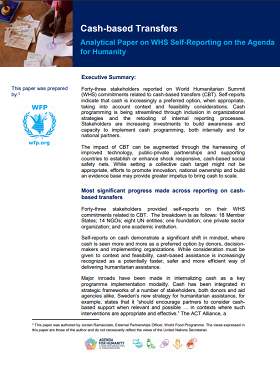
Cash-based transfers. Analytical Paper on WHS Self-Reporting on the Agenda for Humanity
Report
Forty-three stakeholders reported on World Humanitarian Summit (WHS) commitments related to cash-based transfers (CBT). Self-reports indicate that cash is increasingly a preferred option, when appropriate, taking into account context and feasibility considerations. Cash programming is being streamlined...
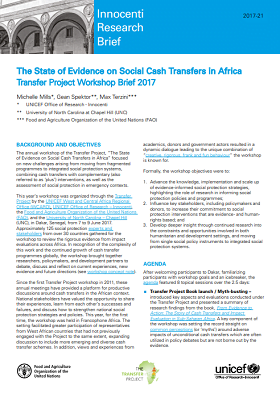
The State of Evidence on Social Cash Transfers in Africa. Transfer Project Workshop Brief 2017
Report
The annual workshop of the Transfer Project, “The State of Evidence on Social Cash Transfers in Africa” focused on new challenges arising from moving from fragmented programmes to integrated social protection systems, combining cash transfers with complementary (also referred to as ‘plus’)...
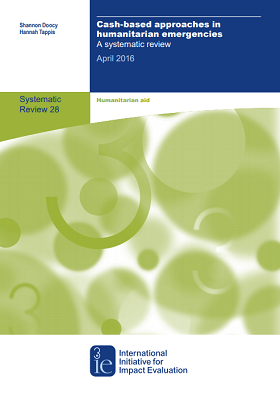
Cash-based approaches in humanitarian emergencies A systematic review. April 2016
Report
Humanitarian actors have a responsibility to ensure that assistance is provided in a way that minimizes risks and maximizes benefits to people affected by crisis. However, there are many challenges in evaluating ‘what works’ in addressing the needs of crisis-affected populations, and translating...

Cash and Markets In The WASH Sector
Report
Market based programming is increasingly heralded as having a critical place in the future of humanitarian programming. The proposed benefits of working through existing market systems include improvements to speed, efficiency and effectiveness of programming and increased beneficiary dignity and...

Economic Impacts of Humanitarian Aid
Report
Humanitarian aid – whether in-kind or cash transfers – can have a significant economic impact. Potential positive effects include stimulating demand, supporting regeneration of local businesses, job creation and increased tax revenue for governments. Potential negative effects include price inflation,...

DFID Shock-Responsive Social Protection Systems research: Literature review
Report
DFID has commissioned research into Shock-Responsive Social Protection systems, to further understand the nature of the interaction between social protection, humanitarian and disaster risk management systems and ways in which long-term social protection systems can be scaled up to
provide support in...

Literature review on the Use of Cash in Shelter
Report
The Global Shelter Cluster (GSC) with support from UNHCR conducted this literature review of the use of cash in shelter programming to help assess how much documented evidence was currently available from within the sector. The objective of this study is to help better prepare the GSC and its members to...

Research: Refugees Can Bolster a Region’s Economy
Report
The world’s refugee population has increased sharply in recent years, leading governments to argue over which countries should take in people displaced by war or other calamities. At the core of this debate is cost: refugees are usually considered an economic burden for the countries that take...

Mobile Money Transfers – For Humanitarian Assistance & Development Programming: Service Provider Perspective
Report
This report summarizes findings from research on how digital payment services providers in Africa have worked with Non-Governmental Organization (NGO) customers to deliver digital payments to their program participants/beneficiaries in the context of providing humanitarian assistance and/or for...
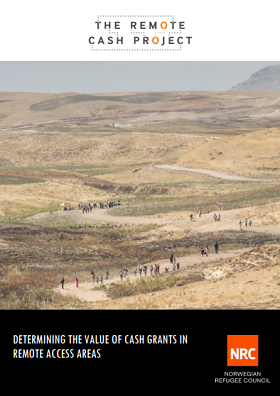
Determining the Value of Cash Grants in Remote Access Areas
Guidelines and Tools
This review aims to complement the work of NRC within the framework of the ECHO funded Remote Cash Project by providing a comparative analysis of different means of determining the size of cash grants, with the development of practical recommendations for approaches that can be used in hard to access...
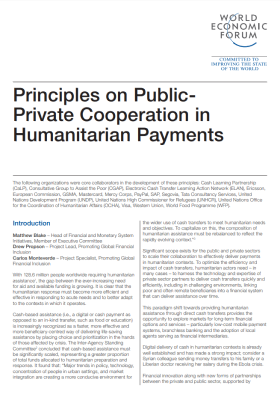
Principles on Public-Private Cooperation in Humanitarian Payments
Guidelines and Tools
E-payments can make the delivery of cash disbursements more secure, cost- effective, faster and more convenient. In the context of humanitarian crises, digital payments offer recipients choice and can help stimulate the local economy. To fully realize the benefits of new technologies and achieve scale,...

Can E-transfers Promote Financial Inclusion in Emergencies: A Case Study from Bangladesh
Report
The Electronic Cash Transfer Learning Action Network (ELAN) launched research to build an evidence base around connecting emergency electronic transfer (e-transfer) recipients with additional financial services. They wanted to learn if, when, and how e-transfers can promote sustained uptake and use...

International Cash based assistance
Report
For more than 60 years, the United States provided assistance to food-insecure countries primarily in the form of food commodities procured in the United States and transported overseas. In recent years, the U.S.government has increasingly provided food assistance in the form of cash transfers or food...

IOM Cash-Based Transfer – Update and Case Studies
Report
Cash-based transfers have a long history in the support of people on the move. Cash or vouchers have been an element of the International Organization for Migration’s resettlement support for people moving to new countries, or returning to countries they had to leave. Increasingly over the last decade,...
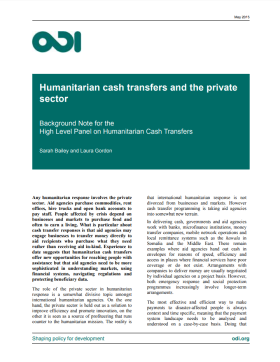
Humanitarian Cash Transfers and the Private Sector
Policy paper
The role of the private sector in humanitarian response is a somewhat divisive topic amongst international humanitarian agencies. This publication discusses the challenges and obstacles to a more effective engagement between the private sector and humanitarian actors as well as the potential role...

State of the Use of Mobile Technologies for Disaster Preparedness in South East Asia
Report
This report summarizes the study conducted by Nanyang Technology University (NTU) in collaboration with the Global Disaster Preparedness Center with support from the USAID-Office of Foreign Disaster Assistance to better understand how new communication and information sharing technologies can enhance risk...
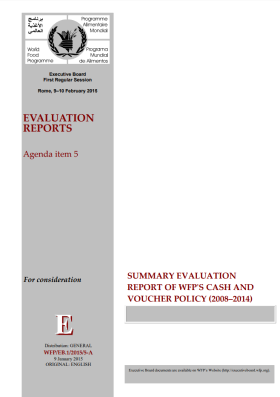
Summary Evaluation Report of WFP’s Cash and Voucher Policy (2008-2014)
Report
The WFP’s Summary Evaluation Report on cash and voucher policy (2008-2014) was commissioned by WFP’s Office of Evaluation in order to assess the quality and results of the policy and its implementation. The evaluation found that although the policy does not represent WFP’s current best...
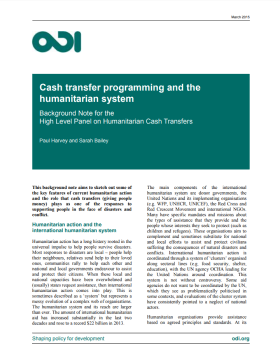
Cash Transfer Programming and the Humanitarian System
Policy paper
Cash transfer programming and the humanitarian system background note aims to sketch out some of the key features of current humanitarian action and the role that cash transfers play as one of the responses to supporting people in the face of disasters and conflict. Additionally, the publication...
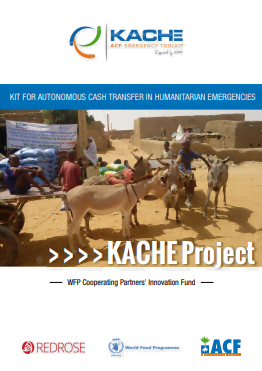
Kit for Autonomous Cash transfer in Humanitarian Emergencies (KACHE)
Guidelines and Tools
The present document reports the development of the Kit for Autonomous Cash transfer in Humanitarian Emergencies (KACHE), built upon Red Rose ONE system© supported by the WFP’s Cooperating Partners’ Innovation Fund (CPIF). Firstly, it gives a brief description of the main features of the kit....
